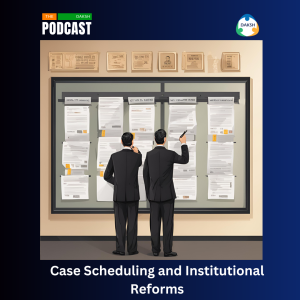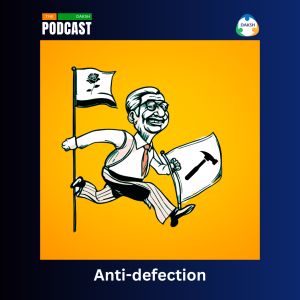

Constitutionality of laws
- Anindita
- /
- The DAKSH Podcast /
- Constitutionality of laws
As many antiquated laws like Section 377, adultery and sedition are being questioned, do you ever wonder what challenging the constitutionality of a law really means? Have you been confused about what striking down and reading down laws are? In this episode, we break down the meaning of “unconstitutionality” and do a quick explainer of what it means to declare a law unconstitutional.
Show Notes
The Supreme Court today morning began hearing a batch of petitions challenging the constitutional validity of the Sedition law. Now in the initial readings has said any system treating women with indignity or discrimination, invites the wrath of the Constitution.
Hi, I’m Anindita and welcome to the DAKSH podcast. We constantly hear the term unconstitutionality of laws in the news. People challenge laws before court. That is, they question its validity. Recent examples include the Aadhaar Act, Section 377 of the Indian Penal Code, the Citizenship Amendment Act, or CAA for the prevention of Money Laundering Act, sedition law, and so on. We also hear the Supreme Court doing a number of things about these challenges. Upholding laws, striking them down, reading them down, decriminalizing things, declaring things arbitrary. What does this all mean? In today’s episode, we’re doing a breakdown of constitutional challenges in court.
First, the basics. ‘We the people’ elect the parliament and state legislatures, they make laws, and we are governed by them. Constitutional Courts, that’s the Supreme Court and High Courts act as a check on the legislature because they have the power to review these laws. More precisely, they can determine if these laws are constitutional. This is the power of judicial review. Right. But when is a law unconstitutional? Sometimes, some laws just don’t seem right. Some of us may not agree with them. Does this mean we can all challenge their constitutionality? Well, no, there is a difference between bad laws and unconstitutional ones. Bad laws are not always unconstitutional laws. Constitutionality is the most minimal criteria a law should meet for it to be valid. Imagine constitutionality as a basic standard. If a law gets any worse than this basic standard, it cannot exist, it is invalid. If it meets this basic standard, it is a valid law but one can still critique it, say it can be better, more efficient. Let me give you an example, say the tax slabs, suppose I want them to be raised or lowered or saved. I think there should be higher income tax for millionaires than there is now. This is a critique. It does not mean that the Income Tax Act is unconstitutional. So saying that a law is unconstitutional means that it does not even fulfill the basic criteria to exist, let alone be a good law. That being cleared, let’s move on. What and where is this basic criteria that determines validity? One thing is clear. It’s in the Constitution. That’s why it’s called constitutional validity. Right?
[Am I right? Or am I right? Or am I right?]
Let’s think about this. The Constitution keeps changing, because the Parliament can amend the Constitution. Does this mean that the basic criteria keeps changing? Let’s go one step further. Can the amendment to the Constitution itself be challenged as not meeting the basic criteria? Things just got confusing. Another trip back to the basics. The constitution is supreme in the hierarchy of law. It is above the penal code, the Income Tax Act, everything, because the basis of all those other laws, that is the process of election, formation of Parliaments and then the enactment of those laws by Parliament, all those processes come from the Constitution. The basic criteria to determine the validity of these other laws therefore, lives within the Constitution. But, it is not the entire Constitution. It is only the most fundamental principles that the Constitution contains.
Some of these principles are expressly written down in the Constitution, for example, the fundamental rights, that’s the right to equality, freedom of speech and expression, right to life, freedom of religion, these are in the Constitution and are one of the basic criteria. So any law that violates these fundamental rights is unconstitutional. For example, the part of the provision in Section 377 of the Indian Penal Code that punishes consensual homosexual acts was declared unconstitutional, because it violates the right to equality. But remember, these are not always the exact words in the text, but the principle behind them. For example, privacy is a right that was recently declared a part of the fundamental rights, but it isn’t expressly written in the Constitution. But as a principle, it exists at the intersection of the right to life and right to freedom of speech and expression. In fact, section 377, was also a violation of the right to privacy, along with equality. So it was unconstitutional on both grounds. Now, does this mean only the fundamental rights in the Constitution form that basic criteria I spoke about? No. There are many other principles all over the constitution that also form this basic criteria, like democracy, secularism, rule of law, and independent judiciary, and many others. All of these principles form what is called the basic structure of the Constitution. There is no hard and fast rule as to which words in the Constitution contain them. And we rely on the judiciary to decipher this basic structure.
Let’s take another example. Say the recent farm laws that attempted to open up the agricultural market. The farm laws were enacted by the Parliament, but agriculture actually comes within the state government’s realm of powers. So the argument was that the parliament has no jurisdiction to pass this law. Only state legislatures do. This is not an argument that relies on fundamental rights. This actually relies on the seventh schedule and article 246 of the Constitution. But before we get carried away with the exact articles, the basic structure this argument wants to highlight is federalism, a principle. Federalism means that state governments have separate and independent powers from the central government. And federalism is part of the Basic Structure of the constitution. So the Basic Structure can come from any part of the Constitution. The Constitution may keep changing in text, but theoretically, its most cherished values, or as the court calls it, the Basic Structure is eternal.
Before I forget, the tricky question of whether constitutional amendments themselves can be challenged, yes, they can also be tested against the Basic Structure. For example, the 103rd amendment introducing 10% reservation and government jobs for economically backward sections was challenged. So when a law is declared unconstitutional by the courts, does that entire law just get removed? Not always. It depends on what was challenged. The lawyers bringing the case may have questioned many provisions, and out of those, the court can uphold some and strike down others. Sometimes, the court can declare only certain interpretations of a particular provision invalid. Let’s go back to the section 377 of the Indian Penal Code.
That provision criminalizes all unnatural sexual acts. The Supreme Court declared that only the interpretation of unnatural acts as homosexual acts is invalid and therefore decriminalized homosexual acts. But the rest of section 377 remains intact. It can still be used to punish bestiality for example. This is called reading down a provision. The words of section 377 remain unchanged, only its interpretation is reduced.
There is a lot more to this topic, like what laws can be challenged, and if only laws can be challenged or government actions as well. And who can bring these challenges to court. But for now, we hope this helps demystify some aspects of constitutional challenges. If you’d like to know more, write to us at info at dakshindia.org, or comment on our social media pages. We would be happy to bring you more episodes like this. If you enjoyed the episode, do consider supporting us with a donation. The link is in the show notes below. Creating this podcast takes effort and your support will help us sustain a space for these quality conversations. To find out more about us and our work, visit our website dakshindia.org. That D-A-K-S-H india.org. Don’t forget to tap, follow or subscribe to us wherever you listen to your podcasts so that you don’t miss an episode. We would love to hear from you. So do share your feedback either by dropping us a review, or rating the podcast where podcast apps allow you to. Talk about it on social media. We’re using the hashtag DAKSH podcast. It really helps get the word out there. Most of all, if you found something useful that might help a friend or family member share the episode with them. A special thank you to our production team at ‘Maed in India’, our production head Niketana K, edited, mixed, and mastered by Lakshman Parshuram, and project supervision by Sean Phantom.
RECENT UPDATE


Bulldozer Justice

Switching Sides: The Intricacies of Anti-Defection in Politics

